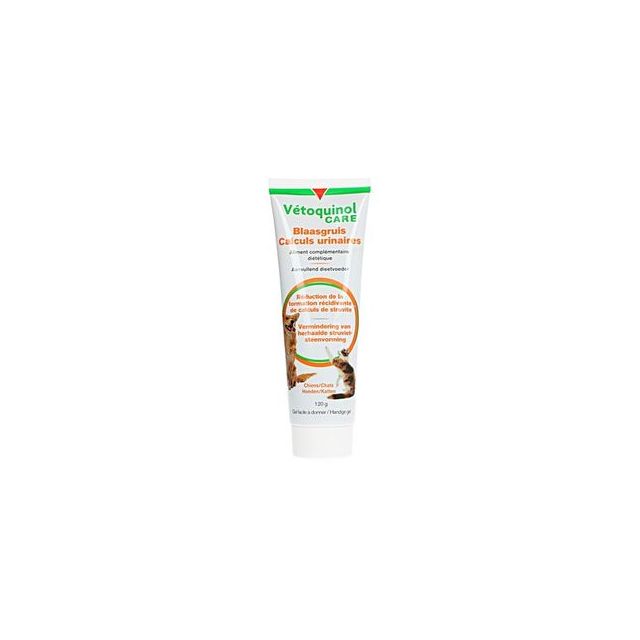Cat bladder infection
Cystitis is very annoying for your cat, but often also for you as an owner, as a significant symptom of a urinary tract infection is incontinence, i.e. urinating outside the litter box! Cystitis in cats sometimes goes away on its own, but it can also be a complex condition that is not easily controlled. We are happy to assist you with information about possible causes, symptoms, and treatments of urinary tract problems.
How does a cat get cystitis?
Cystitis can have various causes in cats, each requiring a different approach.
Most cats with cystitis have what is called idiopathic cystitis. Literally, this means cystitis with an unknown cause. In many cats with this form of cystitis, stress plays a role. Stress can affect the bladder's lining and nerves. Sometimes there are clear reasons for stress, such as a new cat in the house or a baby. But more often, cats are unknowingly stressed. This is most often seen in households with multiple cats and indoor cats. In addition to stress, obesity, inactivity, and insufficient drinking play a role. The litter box can also be a significant part of the problem. If the cat does not like the litter box (too dirty, not enough litter boxes, wrong placement of the litter box, too small box, 'wrong' litter, too intimidating to go to the box), she holds her urine longer, which leads to very concentrated urine, just like drinking too little. Usually, idiopathic cystitis heals itself within a few days, but sometimes the cystitis does not go away on its own and can become a long-term and complex problem, or recur frequently.
A smaller proportion of cats with bladder problems are caused by urinary sediment or stones. Urinary sediment forms microscopic grains that irritate the bladder wall and can clump together to form bladder stones. Generally, cats drink little, and the urine is highly concentrated, which increases the chance of urinary sediment and stones in susceptible animals.
Bacteria are rarely the cause of cystitis in young cats. The chance of a bacterial cystitis is somewhat greater in cats with an underlying condition such as kidney failure or diabetes. However, it is important to investigate this possibility if the cystitis does not go away or quickly returns, as a neglected urinary tract infection can lead to kidney infection!
Only very occasionally is a tumor or congenital disease the cause of cystitis.
Symptoms of cystitis in cats
You can recognize cystitis in your cat by the following symptoms:
- Urinating many small amounts.
- Urination is difficult, it takes a long time and involves much digging in the box.
- Urination is painful; meowing, hissing, or growling during urination.
- Urinating outside the litter box.
- Blood in the urine.
- Abnormal urine smell.
- Frequent washing under the tail.
Cystitis is more dangerous in a male cat than in a female. Accumulation of inflammatory cells and possible urinary sediment can lead to a blockage of the urethra in the penis in males. A male cat that cannot urinate is often referred to as a "blocked cat". A blocked cat is always an emergency, so contact your vet immediately if your male cat cannot urinate or only urinates droplets, even in the evenings or at weekends. Not being able to urinate has serious consequences for the bladder and kidneys; the cat can even die. The blockage must be remedied as soon as possible.
Diagnosis and treatment of cystitis
To best treat cystitis in your cat, it is important to make the correct diagnosis. A physical examination at the vet and a urine test provide information about possible causes, such as urinary sediment. To collect urine from your cat, Katkor granules in a clean and otherwise empty litter box are ideal. These do not absorb moisture, allowing you to suck up the urine with a pipette. If necessary, your vet can also collect urine via a bladder puncture in your cat, if you are unable to collect urine at home.
Medication for Cats with Cystitis
To alleviate pain and inflammation in cats with cystitis, painkillers are often prescribed by your vet. Pharmacy4pets is an online pet pharmacy where you can order these medications, after uploading your vet's prescription.
Your cat may also benefit from supplements promoting healthy bladder mucosa, such as Feluro. Another natural approach is Puur Urogeni. The drops can be given in the mouth or dripped on the paws for the cat to lick off.
Antibiotics are not routinely given, as bacteria hardly ever cause cystitis in cats. However, if a urine culture indicates a bacterial urinary tract infection, antibiotics are of course indicated.
Diet for Cats with Cystitis
If the urine test shows that your cat is suffering from urinary stones, it will need a special diet to resolve this, in addition to possible medication. Cat food for urinary stones, such as Sanimed Anti Struvite cat, lowers the pH (acidity) of the urine, thereby dissolving urinary stones and preventing new ones. This diet can be given permanently. If stopped, there's a high chance that your cat will again suffer from urinary stones. In addition to being effective against urinary stones, Sanimed Anti Struvite food is also suitable for cats prone to idiopathic cystitis. The addition of fish oil and vitamin E has a supportive effect on the bladder wall.
In case of bladder stones, surgery may be necessary to remove the stones.
NOTE: when using dietary food or dietary supplements that affect urine pH such as Sanimed Anti Struvite Cat or Vetoquinol Care Bladder Stone Gel, it's extremely important to consult your vet before use. There are different types of urinary stones, each requiring a different approach. Acidifying the urine can sometimes have a counterproductive effect, if the type of stone (such as calcium oxalate or urate) forms more easily in acidic urine!
Additional Tips for Cystitis Management
In cases of idiopathic cystitis, reducing your cat's stress is very important. Soothing pheromones like Feliway or the naturally calming supplement Zylkene can assist with this.
Encourage your cat to drink more. This dilutes the urine, which is beneficial for the bladder. Place water bowls in various spots and also try a drinking fountain, many cats prefer flowing water. Adding a tasty flavor to the drinking water may help.
Put enough litter boxes in quiet, secluded spots throughout the house and keep them clean daily. A good guideline is the number of cats plus one extra box. Experiment with types of cat litter, so you can find out what your cat likes best. Some cats prefer a covered box, while others prefer an open one. The box should always be large enough for your cat to comfortably assume the urinating posture.
Maintain a healthy weight and don't overfeed your cat. Too much food also means more proteins and salts, the building blocks of urinary stones.
If medical causes have been ruled out and stress seems to play a role, it's wise to engage a cat behavior therapist in time to help prevent frustration in you and your cat(s) as well as high costs.
Treating cystitis in cats can be quite a challenge. Fortunately, in most cats, it is possible to get the symptoms under control. If you have a question about our products or about urinary problems in your cat, please contact us.






